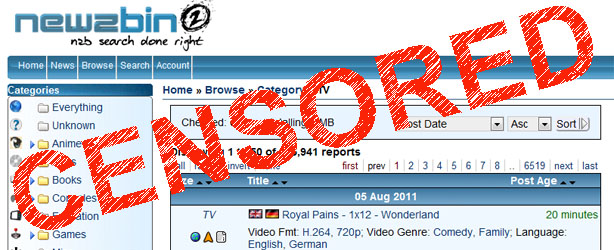The Changing Face Of The Usenet
August 15, 2011 | 08:57
Companies: #bit-tech #bt #newzbin #open-rights-group

The Changing Face of the Usenet
Back when 14.4Kb/sec modems were considered fast, Netscape was the browser of choice and people still liked Bono, you used to get rightly slammed for posting massive binary files on the Usenet. At the time, we called the Usenet Newsgroups, and they were a very early form of social networking. We used them for discussing music, working through computer hardware issues, organising meet-ups with like-minded geeks and discussing TV and films. It was a bit like an encyclopaedic forum, with a discussion group for almost every subject you could imagine.We say 'was', but in fact it still is used by a few people for discussion purposes, which we'll come onto later. That doesn't appear to be the primary use of the Usenet any more, though. If you've been following the Newzbin blocking case that the Motion Picture Association [MPA] has just won against BT, then you'll know that the Usenet is now a convenient way of anonymously sharing large binary files – the exact activity that used to get you pilloried in the Usenet's heyday.
 A High Court judge has ordered BT to block access to Newzbin
A High Court judge has ordered BT to block access to Newzbin'The difference is that Newzbin doesn’t provide access to discussions, i.e. text content, but focuses on popular entertainment content, i.e. binaries,' a spokesperson for the MPA explained to us. However, Jim Killock, executive director of the Open Rights Group thinks that the case isn't as clear-cut as the MPA makes out. 'It's not clear that Newzbin is exclusively used for infringement,' Killock told us, 'which is really the case for blocking it as a whole.'
In many ways, this is a landmark case in the content industries' battle against online copyright infringement – it moves the responsibility from the site and instead places it in the hands of the ISP. According to a press statement from Newzbin, the MPA hasn't even contacted Newzbin directly about the issues, but instead went straight to BT in order to get it blocked.
This, according to Killock, is a great concern. 'We're concerned that it might create a precedent for very broad and overboard website censorship,' explains Killock, 'which wouldn't be aimed at actual copyright infringement, but aimed at disrupting people's access to content as a whole. So, for us, the basic balance here is that it should be aiming at actual infringement; not to be saying: "Well, we don't like this website – we're going to block it."
'Like any forum, if anyone is inciting copyright infringement, the copyright owner has a right to say "this isn't right – please take this down, or remove the comments pointing to file whatever." If Newzbin hadn't been doing that, then there's a case for Newzbin being taken to court, and there's a case for it to change its behaviour, though that's a very different thing from introducing website censorship.'
So why has the MPA gone straight for the censorship option, and why does it think that ISPs should be responsible for blocking content? 'It’s not a question of responsibility,' says the MPA's spokesperson, 'but rather that BT is best placed to do something against a wholesale infringing site like Newzbin.' We ask why the MPA didn't contact Newzbin directly, and the question is dodged. 'Newzbin has a clear verdict levelled against it requiring them to prevent copyright infringement taking place on their site,' responds the MPA spokesperson. 'They are ignoring this verdict and have repeatedly stated that they will continue to infringe no matter what.'

MSI MPG Velox 100R Chassis Review
October 14 2021 | 15:04










Want to comment? Please log in.